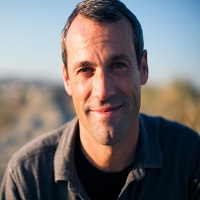Four floors above San Francisco’s 18th Street, in an office not much larger than a walk-in closet, the so-called “sharing economy” is getting a reboot. Three desks are wedged into the space, one occupied by Joshua Danielson, the co-founder of what economists, sociologists and lawyers are beginning to call a “platform cooperative.” You’ve likely heard of Uber and Task Rabbit. Imagine a Task Rabbit where each rabbit owns an equal share of the company. Danielson’s creation, called Loconomics, is a freelancer-owned cooperative marketplace for services, minus bidding and venture capital–backed middlemen. It soon will be accessible from your smartphone.
“This is a business and legal structure where no one is trying to exploit each other and there’s no extraction,” said Danielson, tall, clean-shaven and boyish. His tone and fixed gaze are devoid of web entrepreneur hucksterism. “We’re not a marketplace that is taking profits and giving them to external parties. It’s shared within that same community, still allowing [members] their inde- pendence.” Loconomics initially will focus on six service areas: psychotherapy, massage therapy, house cleaning, dog walking, elder care and childcare. Danielson hopes there will be natural cross-pollination — that the clients of each of these “verticals” will overlap and mesh into a sustainable economic community.
Loconomics is an app still in beta — a phrase that tumbles from the lips of developers in every pour-over coffee emporium in the city. But Danielson wants to do something nobody else has: Wed the convenience and fluidity of smart-phone technology with the ethos of a worker-owned co-op. Set against loud public dialogue about how the tech industry is yet again reshaping San Francisco and widening its wealth gap by raising its cost of living beyond the reach of many workers, Danielson’s app holds promise as a way to start balancing the economic scales. It might reclaim the sharing economy from what San Francisco author and public intellectual Rebecca Solnit calls the “sharecropping economy.”
Displayed upright on a file cabinet flanking Danielson’s desk is the classic 1976 Grateful Dead album “Steal Your Face,” with its iconic red, white and blue skull struck through with a lightning bolt. It was recorded live at a dearly departed San Francisco venue, the Winterland Ballroom. “Not mine,” Danielson said. The album belongs to a person to whom he sublets a work-station in this room, so small that the wall behind Danielson’s desk is scuffed black by the swivel of his chair. To keep costs down, he sublets a second workstation as well. Bootstrapping, indeed.
“The real story here is a shift of power,” Danielson said when we first spoke over the phone. He decided early on to resist the temptation of venture capital funding and built Loconomics with personal lines of credit and a little help from Sallie Mae. He pulled back to minimum payments on the student loans he incurred in an MBA program. He leaned on pro bono lawyers and tapped into the resources of the Sustainable Economies Law Center. He taught himself the basics of web design and worked with a developer in Spain who built the Loconomics code from scratch. “Sure, I’m in debt and mildly delusional,” he said, dryly. “And I still have nothing to brag about until this thing is out in the world — tangible.”
Christopher Tellez, a Reiki and healing arts practitioner with a master’s degree in social work from Columbia University, who works in the same building, bounds into the room fresh from a session with a client. Tellez and Danielson met several years ago when Tellez was offering affordable pop-up clinics at an LGBT center. Danielson, seeing that Tellez had rich community organizing experience and a deep commitment to equity and social justice, invited him to join his board of directors.
“This is awesome,” Tellez remembered saying when Danielson first pitched his idea for Loconomics. “We get to be part of creating something bigger, and I’m putting money into something that is going to come back to me.”
Tellez and Danielson are anxious to see Loconomics released, beginning in the Bay Area. They hope interest will grow in other cities as users sign up. Given their limited resources, scaling up will be cautious and incremental. “Things take time,” Tellez said, “and when you don’t have tons of funders, and you don’t have a gigantic staff, it takes a lot longer.”
“We’ve made it this far, to where it’s not worth taking investment from anybody,” Danielson said. “That’s the key to keeping the ownership amongst all the service professionals. It’s by not giving in.”
The Loconomics app will contain tools for service providers that they might otherwise have to cobble together on their own: scheduling software, financial performance tracking, client management, customizable web profiles, even access to insurance through the Freelancers Union. Danielson is betting that these resources will be incentive enough to join and pay the monthly dues of $30. For the consumer — the user trying to find a house cleaner or a massage therapist — the worker-owned aspect of the platform will likely be little more than an added bonus, Danielson said. The convenience of the technology is important.
“San Francisco has a long history of social justice-minded folks, and I don’t think that that’s going to leave,” Tellez said, as he peered out the window over the rooftops of the rapidly changing Mission District. “I think there’s a lot of people that are socially conscious and that want to make decisions based on…”
“Where their money is going,” Danielson said, finishing Tellez’s thought.
“Yeah,” said Tellez. “They want to feel like they’re doing something positive.”



















